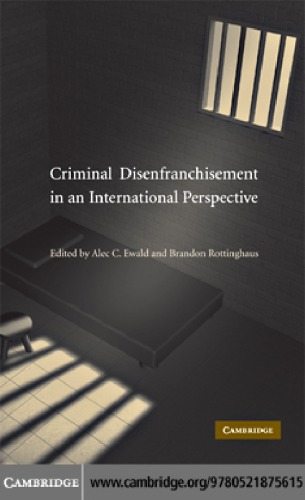

Most ebook files are in PDF format, so you can easily read them using various software such as Foxit Reader or directly on the Google Chrome browser.
Some ebook files are released by publishers in other formats such as .awz, .mobi, .epub, .fb2, etc. You may need to install specific software to read these formats on mobile/PC, such as Calibre.
Please read the tutorial at this link. https://ebooknice.com/page/post?id=faq
We offer FREE conversion to the popular formats you request; however, this may take some time. Therefore, right after payment, please email us, and we will try to provide the service as quickly as possible.
For some exceptional file formats or broken links (if any), please refrain from opening any disputes. Instead, email us first, and we will try to assist within a maximum of 6 hours.
EbookNice Team

Status:
Available4.7
15 reviews
ISBN 10: 0511533764
ISBN 13: 9780511533761
Author: Alec C Ewald
This collection of original essays by leading scholars and advocates offers the first international examination of the nature, causes, and effects of laws regulating voting by people with criminal convictions. In deciding whether prisoners shall retain the right to vote, a country faces vital questions about democratic self-definition and constitutional values - and, increasingly, about the scope of judicial power. Yet in the rich and growing literature on comparative constitutionalism, relatively little attention has been paid to voting rights and election law. This book begins to fill that gap, by showing how constitutional courts in Israel, Canada, South Africa, and Australia, as well as the European Court of Human Rights, have grappled with these policies in the last decade. Chapters analyze partisan politics, political theory, prison administration, and social values, showing that constitutional law is the fruit of political and historical contingency, not just constitutional texts and formal legal doctrine.
PART I CONTEMPORARY DISENFRANCHISEMENT LAW
1 Voting Rights and Human Rights: A Comparative Analysis of Criminal Disenfranchisement Laws
INTRODUCTION
EUROPE
CRIMINAL DISENFRANCHISEMENT LAW IN CONSTITUTIONAL COURTS
Canada
South Africa
The United Kingdom
Israel
Implementation of Court Decisions
MECHANISMS FOR PRISONER VOTING
CONCLUSION
2 Punishment and Social Exclusion: National Differences in Prisoner Disenfranchisement
DATA AND METHODOLOGY
Measures
Analytic Approach
RESULTS
DISCUSSION AND SELECTED CASE STUDIES
CONCLUSIONS
PART II DISENFRANCHISEMENT IN COMPARATIVE PERSPECTIVE: LEGAL AND POLITICAL APPROACHES
3 U.S. Felon Disenfranchisement: Parting Ways with Western Europe
DISENFRANCHISEMENT IN THE UNITED STATES
DISENFRANCHISEMENT UNDER GERMAN LAW
HISTORY AS DESTINY? RACE, FOREIGNNESS, AND CITIZENSHIP
DEMOCRACY, THE CONSTITUTION, LEGAL ELITES, AND THE COURTS
Notions of Democracy
Constitutions and the Courts
Proportionality
JUSTIFICATIONS FOR DISENFRANCHISEMENT: AN INSURMOUNTABLE GULF?
Disenfranchisement as Punishment
Disenfranchisement as Fraud Prevention
Full Citizenship: A Reintegrative Tool
CONCLUSION: MOVING FORWARD? FELON DISENFRANCHISEMENT AS A COMPONENT OF CRIMINAL JUSTICE POLICY: THE
4 The Right to Universal, Equal, and Nondiscriminatory Suffrage as a Norm of Customary International
THE ESTABLISHMENT OF A NORM OF CUSTOMARY INTERNATIONAL LAW: DIRECT AND INDIRECT APPLICATION
EVIDENCE SUPPORTS THE EXISTENCE OF A CUSTOMARY NORM REGARDING THE RIGHT TO UNIVERSAL AND EQUAL SUFFR
The Customary Norm to Be Established Is the Right to Universal and Equal Suffrage without Disproport
The Factual Predicates for Establishment of the Norm
The Survey Data
OTHER PRIMARY EVIDENCE OF THE NORM
Global Bodies and Their Jurisprudence
Regional Bodies and Their Jurisprudence
National Jurisprudence
The Limitation on Racial Discrimination
CONCLUSION
Sources
5 Our -Crooked Timber’: Why Is American Punishment So Harsh?
INTRODUCTION
WHERES OUR DOPPELGANGER?
HISTORY AND POLITICS
WHAT CAUSES HIGH INCARCERATION RATES?
THE RELIGIOUS RIGHT
AMERICAN DEMOCRACY: TOO MUCH OF A GOOD THING?
CONCLUSION
PART III VOTING RIGHTS AND PEOPLE WITH CRIMINAL CONVICTIONS: CASE STUDIES
6 The Politics and Legality of Prisoner Disenfranchisement in Australian Federal Elections
INTRODUCTION
THE COMMONWEALTH ELECTORAL ACT 1918
LEGISLATIVE HISTORY
CONSTITUTIONAL ISSUES
AUSTRALIA 2006: TOTAL PRISONER DISENFRANCHISEMENT IN FEDERAL ELECTIONS
Promoting “Integrity”: A Rerun of “Purity v. Pollution”?
Citizenship, Human Rights, Participation, and Democracy
International and Comparative Law
Rehabilitation?
WHY DISENFRANCHISEMENT NOW?
POTENTIAL CHALLENGES TO DISENFRANCHISEMENT
COMPLAINING TO THE HUMAN RIGHTS AND EQUAL OPPORTUNITY COMMISSION
FUTURE HIGH COURT CHALLENGE
CONCLUSION
POSTSCRIPT
7 The Campaign for Prisoner Voting Rights in Ireland
INTRODUCTION
LEGAL HISTORY
1870–1963: Disqualification
1963–2001: Pragmatism over Principle?
2001–2004: The Consolidation of Institutional Apathy
HIRST V. UNITED KINGDOM AND THE RENEWED CAMPAIGN FOR VOTING RIGHTS
CONCLUSION
Bibliography
8 The Ballot as a Bulwark: Prisoners’ Right to Vote in South Africa
INTRODUCTION
THE HISTORY OF PRISONERS’ RIGHTS
THE AUGUST AND NICRO CASES
CONCLUSION
9 The Right to Vote in Danish Prisons
INTRODUCTION
OVERVIEW OF THE PRISON SYSTEM, PENALTIES, AND SENTENCING
THE RULES GOVERNING PRISONERS’ RIGHT TO VOTE
THE PRACTICE OF PRISONER VOTING
ELECTIONS AND TASKS OF THE PRISONERS’ SPOKESMEN
CONCLUDING REMARKS
Bibliography
Legal and Statistical Sources
Books and Articles
Magazines and Newspapers
Internet Links
10 In Defense of Prisoner Disenfranchisement
LITIGATING PRISONER DISENFRANCHISEMENT IN CANADA
SAUV (NO. 2) AND THE LIMITS OF DIALOGUE
IN DEFENSE OF PRISONER DISENFRANCHISEMENT
CONCLUSION
References
felony disenfranchisement north carolina
felony disenfranchisement refers to which one of the following
criminal defenses quizlet
felony disenfranchisement quizlet
felony disenfranchisement pros and cons
felon disenfranchisement policies primarily reflect what
Tags: Alec C Ewald, Criminal, disenfranchisement